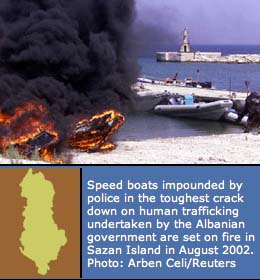Female victims are trafficked to Italy and other EU countries for sexual exploitation.
Type: Source and Transit Country
Background
Albania was an economic ruin when it emerged 12 years ago from the ironfisted rule of communist dictator Enver Hoxha. High rates of poverty and unemployment, a crumbling infrastructure, and corrupt elected officials made the nation fertile ground for smuggling in drugs, weapons, and women. Albania’s government has estimated the number of Albanian women and girls trafficked to Western Europe and other Balkan countries between 1991 and 1999 for sexual exploitation at 100,000. Criminal organizations based in the capital Tirana and the cities of Vlora, Bekat, Shkodra, and Fier rely on speedboats for transporting victims across the Adriatic Sea to Italy, a trafficking stronghold. Albania’s northern regions were more sheltered from the trade thanks to the prevalence in rural communities of a traditional code that dictates revenge killings for traffickers who lay hold of a female family member. However, by the late 1990s, lack of economic opportunity had undermined even this traditional safeguard as thousands of Albanian men and boys went abroad to work. Today, trafficking victims come from all parts of Albania; in particular, from rural areas where poverty is higher, education levels lower, and familiarity with traffickers’ ploys less extensive.
Victims
Albania not only supplies women and girls for the international sex trade, but also acts as a major hub through which women from countries further East are taken to Western European markets. Albanian women and girls are either lured by false promises of marriage or offers of legitimate employment or kidnapped to work as prostitutes. Ranging in age from 14 to 35, girls trafficked from Albania are among the youngest victims worldwide, with as many as 80 percent of them younger than 18, according to a 2000 Save the Children report. They are brought to work primarily in Italy as street prostitutes, the most dangerous and unpredictable form of prostitution. Some Albanian girls are trafficked to other countries such as Belgium, Greece, the Netherlands, and the United Kingdom. In Italy, according to a 2001 Save the Children report, Albanian pimps reportedly expect their teen-aged prostitutes to earn between $200-$550 a night. Most of the women never receive a cut of the money they make.
Foreign women and girls, the majority of whom are from Moldova and Romania, are also trafficked through Albania for sexual exploitation. Brought in via Romania, Serbia, Montenegro, or Macedonia, they are bought and sold in Albania before being sent to the port cities of Durres or Vlora for passage to Italy.
Albanian children, both boys and girls, are trafficked to Greece and Italy to beg, wash car windows, and deal in drugs. Most of those trafficked come from Albania’s ethnic Roma minority, a traditionally disadvantaged group. Often in exchange for a monthly stipend, very poor families give their children to traffickers, who take them across the border to Greece by foot or by boat to Italy to work as forced laborers. The children’s parents only receive a small fraction of what they earn, which may average almost $1,000 per month, according to the 2001 Save the Children report “Child Trafficking in Albania.”
Counter-Trafficking Efforts
After years of denying that trafficking was a problem, Albania has recently reversed course. Driving the bid for change is the country’s desire to enter the European Union — an ambition that could be undermined by international criticism of the government’s response to the trafficking problem. In 2001, Albania made trafficking in women and children a criminal offense and adopted a national plan to fight human trafficking. In conjunction with the National Action Plan, TV programs are broadcast to raise awareness about traffickers’ methods and the government has paired with NGOs to train teachers to educate students about the trafficking issue. Albanian police have patrolled the Adriatic since 2002 together with Italian law enforcement in a successful attempt to curb the speedboat traffic that ferries victims from Albania to Italy. Much work still remains for Tirana, however. Corruption among police and elected officials is high — a situation that can interfere with the successful prosecution of traffickers. Though prosecutions have increased, conviction and sentencing rates remain low.
- Previous: Introduction
- Next: China



